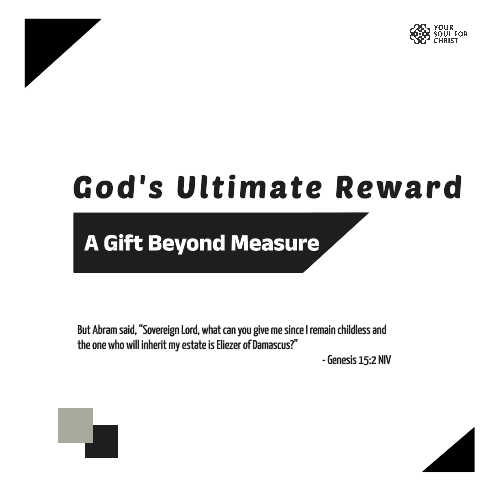But Abram said, “Sovereign Lord, what can you give me since I remain childless and the one who will inherit my estate is Eliezer of Damascus?”
Genesis 15:2 NIV
Imagine God offering Himself as a reward, as He did to Abram. In this passage, God offers Abram something extraordinary: God’s ultimate reward—His own presence as a shield and abundant provision. However, Abram’s immediate response reflects his preoccupation with an unfulfilled desire for a child. Instead of fully embracing God’s ultimate reward, Abram questions its value in light of his childlessness.
This story highlights an essential truth for believers: nothing compares to God’s ultimate reward—His presence, protection, and provision. Yet, like Abram, we often allow unmet desires to overshadow this profound gift.
God’s offer to Abram—His very presence and provision as a shield and reward—was unmatched in significance. Yet, Abram’s childlessness clouded his focus, overshadowing the greatness of God’s promise. Abram’s response, beginning with “but,” hinted at doubt. His question, “What good is Your reward if I remain childless?” implied, even unintentionally, that God’s presence alone was insufficient to satisfy his deepest longing.
This response could have taken a different tone if rooted in trust. Instead of questioning God’s sufficiency. Abram might have asked, “When will You fulfil Your promise of a child?”. Such a question would have shifted the emphasis from doubt to faith in God’s timing and faithfulness.
God had already assured Abram of descendants. Abram faced the same challenge we do: trusting God’s timing instead of letting unmet desires overshadow the beauty of His presence. When God declared, “I am your shield and your abundant reward,” He reaffirmed His promises. He also invited Abram to find ultimate contentment and security in Him.
This exchange teaches a powerful lesson. We must not let our unfulfilled desires blind us to the immeasurable value of God’s presence. Knowing God and having Him as our protector and provider is far greater than any temporary blessing He could give.
Abram risked valuing a specific blessing—having a child—over the infinite worth of possessing God Himself. While his longing for an heir was valid, it could never compare to the unmatched gift of God’s presence.
In conclusion, this passage challenges us to examine our priorities. Are we so focused on our unmet desires that we fail to appreciate the profound gift of God’s presence in our lives? Like Abram, we may face moments where our needs feel overwhelming, but God reminds us that His presence is more than enough. To possess God is to possess everything we could ever need. Let us not trade the eternal joy of knowing Him for the fleeting satisfaction of temporal blessings.
Let us embrace God’s ultimate reward and find contentment in Him, knowing that He is all we need.
